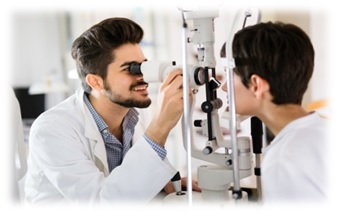| Bachelor of Optometry (B.Optom.) | |
| Intake: | 40 |
| Duration: | 4 yrs |
| Eligibility: | 12th with PCBE/PCME |
| Tuition Fee: | Rs.80,000/-per year |
The new programmes in Allied Health Sciences have been introduced with a focus on skill-based training of students that would translate to immediate employability. The burgeoning needs of our nation’s healthcare sector that is growing by leaps and bounds gives perspective to these programs. The high entrepreneurial desires of the new generation have also been addressed through these programmes. These programmes have been structured and curriculum designed to enhance innovation with incorporation of research projects, electives and sections to address all domains of Knowledge, Attitude, Skills and Communication Skills.
Furthermore, the programmes have an integrated interdisciplinary content that run together with the active professional support and participation from D. Y. Patil Medical College and Hospital for the relevant aspects of General Anatomy & Physiology, Biochemistry, Pathology and Microbiology. Additionally, the students will be posted in the D. Y. Patil Hospital for clinical and trade experience during the entire duration of the Programmes.
 Optometry as a subject involves several facets including examining, diagnosing, managing and treating the diseases of eyes. It also deals with the working of eye equipments, provision of corrective lenses and also facilitate the running of specialty clinics for Low vision, contact lens and binocular vision. An optometrist is regarded as an independent primary healthcare provider who is specialized in providing eye care and upholding visual health.
Optometry as a subject involves several facets including examining, diagnosing, managing and treating the diseases of eyes. It also deals with the working of eye equipments, provision of corrective lenses and also facilitate the running of specialty clinics for Low vision, contact lens and binocular vision. An optometrist is regarded as an independent primary healthcare provider who is specialized in providing eye care and upholding visual health.
Graduates can be employed in the hospitals and clinics to assist ophthalmologist and also in national/ multinational eye care companies. Ample self-employment opportunities are also available of setting up optical shops, starting own specialty clinics for contact lenses, kiosks on computer vision. Alternately, the optometrist can also seek well-paid jobs in the manufacturing units of lenses, ophthalmic instruments etc. In addition, avenues in higher education to pursue Post graduation/ fellowship / doctoral programs and/or take up teaching optometry as a life time option.
The Programme aims at preparing a primary healthcare professional, an “Optometrist” who can independently undertake following activities.- • Estimate refractive errors of the eye and prescribe corrective measures including Spectacles, Contact Lenses, Low Vision Aids and Vision Therapy.
- • Detect pathological conditions of the Visual system, which are deviations from normal. Diagnose ocular and related systemic and neurological diseases and refer the cases to Ophthalmologists or other medical professionals for detailed medical and surgical management.
- • Design, manufacture, prescribe and fit all kinds of Optical aids including Spectacles, Sunglasses, Ophthalmic lenses, Contact Lenses, Low Vision aids.
- • Examine, diagnose and prescribe treatment for Oculo-motility malfunctions like phorias, tropias and other types of strabismus (squint) and Neuro-muscular anomalies.
- • Undertake Public Health Optometry projects and vision screening eye camps in schools, colleges, urban slums, rural areas and also practice occupational Optometry in industries.
- • Public education on ocular hygiene and related nutritional and environmental counseling.